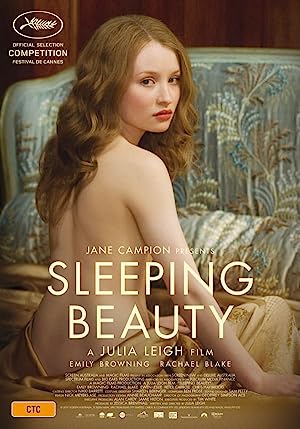Sleeping Beauty is no Disney fairytale. Sleeping Beauty is an Australian film, i.e. full frontal male and female nudity, about a young woman who works multiple jobs to go to school. When she gets the opportunity to get paid a lot of money to literally sleep in the nude with unknown men without penetration, which is more sleep than she is currently getting and she is already being penetrated in at least two of her jobs (and I’m not necessarily referencing sex), she jumps at the chance. Unfortunately it is this job that shakes her usually stoic and remote demeanor.
When I saw that Emily Browning stars in Sleeping Beauty, I knew that I was not going to be into it. I have no issue with Browning’s acting, I just have yet to see her in a film and love it other than Plush: The Uninvited and Sucker Punch. I enjoyed Legend, but Legend was really Tom Hardy’s film. It is correlation, not causation.
While Sleeping Beauty resonates because most people can relate to anyone in survival mode, Sleeping Beauty’s Eyes Wide Shut scenarios interspersed with heavy-handed philosophical musings by the participants or professors makes the film feel more distant and theoretical, which reflects the mood of the main character. The titular character is shaken by two things: her increasingly lack of meaningful connection with another human being and her mental absence during her sleeping sessions. Both factors are rooted in loss, which she was so accustomed to that loss, it rendered her numb, but now this loss feels new and different. Her other jobs are arguably demeaning, but she has autonomy, memories, agency. Because she is drugged, she has no idea what happens in those sessions. When the two factors that shake her collide in the final scene, I got the sense that she started Sleeping Beauty with one problem, poverty, and ended up with an awareness of many more: financial and spiritual poverty, fear and mortality. I suspect that her downward spiral continues long after Sleeping Beauty ends.
Sleeping Beauty is a slice of life movie so it never provides a character to deliver exposition lines to explain who everyone is. We know that most people hate her: her roommates, her boss at her office job, her former friends. By implication, we know that her family life is practically non-existent except for her financial assistance. Her only friend is a mystery. I have no idea what she was studying in school. I was more interested in the women around her, specifically Clara, the woman in charge of the various Eyes Wide Shut services, and the head waitress at the formal dinner party, especially after she calmly said, “What kind of question is that.” I thought it was a fairly innocuous one, and I did not fully get her meaning other than it was a sharp boundary between her job and her life.
After I saw Sleeping Beauty, I discovered that the director was making Biblical references to an elderly King David lying in bed with virgins to stay warm, which is objectively repugnant and casually exploitive even without the penetration. Like many films with female directors, Sleeping Beauty examines the perspective of the character in the story that is usually not the focus of the narrative, which is a great move theoretically. The actual result, Sleeping Beauty, is a bleak and cold movie, which I usually enjoy, but I did not get lost in the film. Sleeping Beauty may appeal to feminist philosophers, but the actual result left me wanting more.
Stay In The Know
Join my mailing list to get updates about recent reviews, upcoming speaking engagements, and film news.





